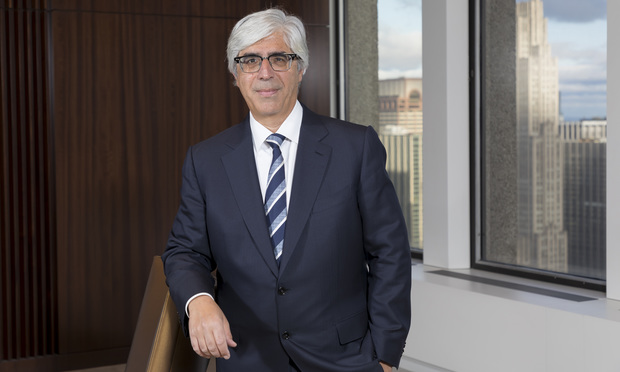With Big Oil Facing Off Against Calif. Communities, Ninth Circuit Once Again Weighs Climate Change Suits
The court on Wednesday heard arguments from lawyers for local California governments who are seeking to pursue claims against oil companies in state court to pay infrastructure costs tied to rising sea levels.
February 05, 2020 at 03:53 PM
4 minute read
 Theodore J. Boutrous Jr., with Gibson, Dunn & Crutcher, on Oct. 18, 2019.
Theodore J. Boutrous Jr., with Gibson, Dunn & Crutcher, on Oct. 18, 2019.
Lawyers for a group of local California governments are pressing the U.S. Court of Appeals for the Ninth Circuit to allow them to pursue state court claims against some of the world's largest oil companies for infrastructure costs tied to rising sea levels.
A Ninth Circuit panel on Wednesday—Judges Sandra Ikuta, Morgan Christen and Kenneth Lee—heard arguments in a pair of appeals from two separate sets of cases where federal judges in San Francisco offered up divergent rulings: U.S. District Judge Vince Chhabria of the Northern District of California in March 2018 remanded cases brought by the city of Imperial Beach and San Mateo and Marin counties to state court finding that they weren't appropriate for removal to federal court. Meanwhile, Chhabria's colleague U.S. District Judge William Alsup denied a remand request in cases brought by the cities of Oakland and San Francisco and later dismissed their cases outright in June 2018 holding that climate change "deserves a solution on a more vast scale than can be supplied by a district judge or jury in a public nuisance case."
Arguing on behalf of Chevron Corp. and a collection of large oil companies Wednesday, Gibson, Dunn & Crutcher's Theodore Boutrous Jr. said that the plaintiffs' "sweeping, unprecedented global warming tort claim" was attempting to hold his clients liable for oil production going back to the dawn of the industrial revolution. He argued that the plaintiffs' claims were removable to federal court on several grounds, including that they attempted to hold the oil companies liable for oil production actions taken at the direction federal officials on federal property. In particular, he pointed to the defendants' operations on the Outer Continental Shelf, home to one-third of all domestic oil production, and the Elk Hills Naval Petroleum Reserve, where Chevron's predecessor Standard Oil operated an oil field under the Navy's direction for most of the 20th century.
"We don't need a lot of federal jurisdiction, we just need some'' for removal to federal court, Boutrous said urging the Ninth Circuit panel to overturn Chhabria's ruling. "This is a federal case because of the interstate nature of the case," he said. Boutrous noted that the argument comes a little more than two weeks after a separate Ninth Circuit panel found that 21 young plaintiffs failed to establish standing in a case seeking to force the government to provide a livable climate. There, Boutrous noted, that Judge Andrew Hurwitz wrote for a divided panel that some "questions—even those existential in nature—are the province of the political branches" and inappropriate for judicial solutions.
Victor Sher of Sher Edling, arguing on behalf of the California municipalities, however, said that defendants had mischaracterized his clients' claims. They weren't, he contended, targeting oil production but what he characterized as a "50-year campaign" to mislead the government and the public about the long-term effects of greenhouse gas emissions on the Earth's climate and the science behind climate changes. "The complaint rests on the defective nature of the product and the campaign of deception and denial over the past 50 years," Sher said.
In the appeal of Alsup's ruling, Michael Rubin of Altshuler Berzon argued on behalf of Oakland and San Francisco, Kannon Shanmugam of Paul, Weiss, Rifkind, Wharton & Garrison argued on behalf of the out-of-state oil companies, and Principal Deputy Assistant Attorney General Jonathan Brightbill argued on behalf of the government backing dismissal.
This content has been archived. It is available through our partners, LexisNexis® and Bloomberg Law.
To view this content, please continue to their sites.
Not a Lexis Subscriber?
Subscribe Now
Not a Bloomberg Law Subscriber?
Subscribe Now
NOT FOR REPRINT
© 2025 ALM Global, LLC, All Rights Reserved. Request academic re-use from www.copyright.com. All other uses, submit a request to [email protected]. For more information visit Asset & Logo Licensing.
You Might Like
View All
No Two Wildfires Alike: Lawyers Take Different Legal Strategies in California
5 minute read
Judge Orders SoCal Edison to Preserve Evidence Relating to Los Angeles Wildfires
4 minute read
Prologis' 30-Year Legal Chief to Exit After Helping Build $100B Powerhouse
3 minute read
Class Action Suit Alleges Amazon Failed to Pay Out Employees' Paid Personal Time, Vacation Wages
2 minute readLaw Firms Mentioned
Trending Stories
- 1NBA Players Association Finds Its New GC in Warriors Front Office
- 2Prenuptial Agreement Spousal Support Waivers: Proceed With Caution
- 3DC Circuit Keeps Docs in Judge Newman's Misconduct Proceedings Sealed
- 4Litigators of the Week: US Soccer and MLS Fend Off Claims They Conspired to Scuttle Rival League’s Prospect
- 5Litigator of the Week Runners-Up and Shout-Outs
Who Got The Work
J. Brugh Lower of Gibbons has entered an appearance for industrial equipment supplier Devco Corporation in a pending trademark infringement lawsuit. The suit, accusing the defendant of selling knock-off Graco products, was filed Dec. 18 in New Jersey District Court by Rivkin Radler on behalf of Graco Inc. and Graco Minnesota. The case, assigned to U.S. District Judge Zahid N. Quraishi, is 3:24-cv-11294, Graco Inc. et al v. Devco Corporation.
Who Got The Work
Rebecca Maller-Stein and Kent A. Yalowitz of Arnold & Porter Kaye Scholer have entered their appearances for Hanaco Venture Capital and its executives, Lior Prosor and David Frankel, in a pending securities lawsuit. The action, filed on Dec. 24 in New York Southern District Court by Zell, Aron & Co. on behalf of Goldeneye Advisors, accuses the defendants of negligently and fraudulently managing the plaintiff's $1 million investment. The case, assigned to U.S. District Judge Vernon S. Broderick, is 1:24-cv-09918, Goldeneye Advisors, LLC v. Hanaco Venture Capital, Ltd. et al.
Who Got The Work
Attorneys from A&O Shearman has stepped in as defense counsel for Toronto-Dominion Bank and other defendants in a pending securities class action. The suit, filed Dec. 11 in New York Southern District Court by Bleichmar Fonti & Auld, accuses the defendants of concealing the bank's 'pervasive' deficiencies in regards to its compliance with the Bank Secrecy Act and the quality of its anti-money laundering controls. The case, assigned to U.S. District Judge Arun Subramanian, is 1:24-cv-09445, Gonzalez v. The Toronto-Dominion Bank et al.
Who Got The Work
Crown Castle International, a Pennsylvania company providing shared communications infrastructure, has turned to Luke D. Wolf of Gordon Rees Scully Mansukhani to fend off a pending breach-of-contract lawsuit. The court action, filed Nov. 25 in Michigan Eastern District Court by Hooper Hathaway PC on behalf of The Town Residences LLC, accuses Crown Castle of failing to transfer approximately $30,000 in utility payments from T-Mobile in breach of a roof-top lease and assignment agreement. The case, assigned to U.S. District Judge Susan K. Declercq, is 2:24-cv-13131, The Town Residences LLC v. T-Mobile US, Inc. et al.
Who Got The Work
Wilfred P. Coronato and Daniel M. Schwartz of McCarter & English have stepped in as defense counsel to Electrolux Home Products Inc. in a pending product liability lawsuit. The court action, filed Nov. 26 in New York Eastern District Court by Poulos Lopiccolo PC and Nagel Rice LLP on behalf of David Stern, alleges that the defendant's refrigerators’ drawers and shelving repeatedly break and fall apart within months after purchase. The case, assigned to U.S. District Judge Joan M. Azrack, is 2:24-cv-08204, Stern v. Electrolux Home Products, Inc.
Featured Firms
Law Offices of Gary Martin Hays & Associates, P.C.
(470) 294-1674
Law Offices of Mark E. Salomone
(857) 444-6468
Smith & Hassler
(713) 739-1250






